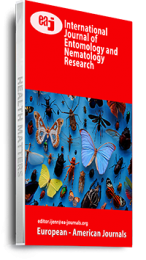The present study was carried out to evaluate the effect of clove and garlic oils as safe alternatives to chemical insecticides Malthion, Eco2fumeÒ gas and Gastoxin 57% Tablets (Aluminum Phosphide) in controlling two insect species; the rice weevil, Sitophillus oryzae L. (Coleoptera: Curculionidae) and the rust-red flour beetle, Tribolium castanum Herbst (Coleoptera: Tenebrionidae). In addition, the effects of tested plant oils and chemical insecticides on progeny production and seed germination percentages of wheat grains were also performed. The results showed a decrease in the number of progeny produced by S. oryzae and T. castaneum under all the treatments used. In general, the use of Gastoxin 57% (tablets) and Eco2fumeÒ gas led to the absence of progeny of both insects, where the percentage of reduction reached 100%, followed by garlic oil (reduction rates were 98.81 and 100% for S. oryzae and T. castaneum, respectively). The lowest reduction rates were under clove oil, as the reduction of progeny was 96.42 and 86.95% for S. oryzae and T. castaneum, respectively. On the other hand, the largest reduction in wheat grains germination was shown under Eco2fumeÒ gas treatment (81.00%) followed by Tablets (83.25%) then garlic oil (85.50%). In the contrast the highest grain germinations was presented in the control treatment (90.25%) followed by clove oil (86.50%).
Citation: Darwish, A. A. E; M. A. El-Aw; S. I. S. Askar; and E. M. E. Al-Kodaby (2022) Effects of clove and garlic oils, Malthion, Eco2fume gas and Aluminum Phosphide on mortality and progeny production of two stored grain insect species, Sitophillus oryzae L. and Tribolium castanum Herbst, International Journal of Entomology and Nematology Research, Vol.6, No.1, pp.47-59
Keywords: Aluminum phosphide, Eco2fume gas, Garlic, Malthion, Sitophillus oryzae and Tribolium castaneum, clove, oils

